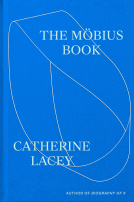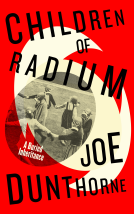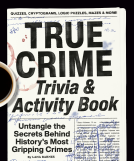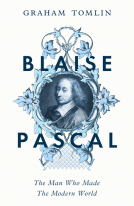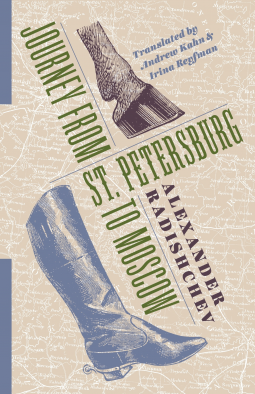
Journey from St. Petersburg to Moscow
by Alexander Radishchev
This title was previously available on NetGalley and is now archived.
Send NetGalley books directly to your Kindle or Kindle app
1
To read on a Kindle or Kindle app, please add kindle@netgalley.com as an approved email address to receive files in your Amazon account. Click here for step-by-step instructions.
2
Also find your Kindle email address within your Amazon account, and enter it here.
Pub Date Nov 03 2020 | Archive Date Feb 10 2021
Talking about this book? Use #JourneyfromStPetersburgtoMoscow #NetGalley. More hashtag tips!
Description
Radishchev’s literary journey is guided by intense moral conviction. He sought to confront the reader with urgent ethical questions, laying bare the cruelty of serfdom and other institutionalized forms of exploitation. The Journey’s multiple strands include sentimental fictions, allegorical discourses, poetry, theatrical plots, historical essays, a treatise on raising children, and comments on corruption and political economy, all informed by Enlightenment arguments and an interest in placing Russia in its European context. Radishchev is perhaps the first in a long line of Russian writer-dissenters such as Herzen and Solzhenitsyn who created a singular literary idiom to express a subversive message. In Andrew Kahn and Irina Reyfman’s idiomatic and stylistically sensitive translation, one of imperial Russia’s most notorious clandestine books is now accessible to English-speaking readers.
Advance Praise
"Combining profound linguistic sophistication with enviable literary style, Andrew Kahn and Irina Reyfman, two of today’s most esteemed scholars of Russian literature, have produced the definitive translation of Radishchev’s classic revolutionary cri de coeur."
-Douglas Smith, author of Rasputin: Faith, Power, and the Twilight of the Romanovs
Available Editions
| EDITION | Other Format |
| ISBN | 9780231185912 |
| PRICE | $19.95 (USD) |
Featured Reviews
 Victoria I, Media/Journalist
Victoria I, Media/Journalist
For readers fascinated with Russian Literature and history, there are a few classics that can slip through the cracks amid readings of Dostoevsky and Gogol. One of these great works is Alexander Radischev's Journey from St. Petersburg to Moscow. The story is a fictional trip along a Russian postal route into the country. However, it is so much more. This work includes concepts of philosophy, social injustice, and points a weary eye at the Russian politics of Catherine the Great.
For those who doubt the power of this book through an initial read through, remember that this book was thought to be so dangerous, that Radischev was sentenced to death for writing it. Thankfully, the government backed off a bit on the part and just sent him to the freezing world of Siberia instead (although some would argue, not better). Though fictional, there is just enough truth within the work that Journey from St. Petersburg to Moscow made readers of the day (and today as well) think.
This is an incredible historical document, and a fascination evocation of Catherine the Great's complex, callous and oftentimes astounding Russia. It is inventive in style and ambitious in its merging of so many varied forms of poetry, prose and expression. It is remarkably progressive, too, in its philosophy, ideals and encapsulation of its own time. A real treat for lovers of history and literature alike.
I received a digital copy via NetGalley in exchange for an honest review.
This is a really nice translation of an important book, and one that makes Radishchev accessible and even enjoyable to an English-speaking audience. While I'm able to read in Russian, Radishchev is not an author I feel very confident tackling in the original--and this translation worked really well for me. I enjoyed it and found myself digitally highlighting passages in nearly every chapter--it's not exactly light reading, but certainly worthwhile for those with an interest in Russian intellectual and political history. Many of Radishchev's observations and ideas are striking and relevant even today, even beyond their true significance to Russian history and literature. This is a book that is meant to make the reader think, and it does.
The introduction to this translation is interesting and informative, and provides a good amount of historical context on Radishchev and his work. It's probably most helpful and of more interest to someone with some background in Russian history, and I can't speak to how accessible it would be for someone without that background--but personally, having the necessary background, I really liked it.
 Reviewer 499835
Reviewer 499835
Journey from St. Petersburg to Moscow is a wild fever dream of a trip through late 18th century Russia in the company of a traveller who sees everything and reacts with febrile and intense emotion to what he sees. This translation is weepy-marvelous. I kept stopping to write down passages I wanted to remember, just for the beauty of the language and the oddness of the scene. The introduction to the work in this edition is outstanding--both fascinating to read and deeply informative. I'm not an expert in the author or the era, but reading the book was a marvelous and intense experience. I kept trying to keep in mind that this work was banned and nearly all copies destroyed of it by Catherine the Great and the author exiled to Siberia--it's important to read the work in this context--but at the same time the writing is so harshly satirical and so exaggerated that I'm reminded more than anything of Voltaire's Candide, written a few decades earlier, and I guess that leads me to ponder how differently wend the fates of scholars and writers, depending on where they happen to live and write. And it amazes me anew to ponder how dangerous it is, after all these centuries, for Russians to speak out or criticize those in power in their country. An exuberant, harsh, confusing, demanding, and ever-enlightening read.
Very, very good introduction. As for the book itself, I wish I was more interested in it, unfortunately I found it a bit too preachy. However I must admit it was definitely advanced for its time and it took lots of courage on Radischev's part.
 jean luc e, Librarian
jean luc e, Librarian
Originally published in 1790, Alexander Radishev's incredible travel log depicting the deplorable socio-economic realities of late 18th century Russia, attracted right away the wrath of Catherine the Great & her government, almost costing Radishev his life and a one way ticket into the depths of a harsh Siberian exile.
More than a travel journal within the confines of an. Russian Empire almost feudal at the time, it is a meticulous catalog of all the ills plaguing its entire society at the tail end of the tsarina's long reign.
Introducing radicalism into Russian prose for the first time ever, Radishev became inadvertently the greatest influence for several generations of Russian writers during the 19th century
It is an unavoidable read for anyone interested by Russian history.⁸
Many thanks to Netgalley and Columbia University Press for the opportunity to read this magnificent book prior to its release date
 Edward K, Reviewer
Edward K, Reviewer
Not really a coherent narrative, but rather 25 loosely connected vignettes about the state of Russian society in the 18th century, especially the horrors inflicted upon the serfs.
The chapters that deal with this or the corruption of the nobility are fascinating, heartbreaking, and unfortunately still relevant. I was rather surprised by the vehement denunciation of slavery, especially in the Americas. The guilt he discusses in using products made from American slavery still reverberate in today's society as many deal with the ethical implications of buying things made in sweatshops or using child labor.
Other chapters go on long tangents on the history of censorship or Russian poetry. The author himself seems to be aware that these are not for everybody and informs the reader they can skip these or even take a nap. I assure you that nothing will be lost if you do.
Thanks to NetGalley and Columbia University Press for the ARC, and also the latter for continuing to put out all these great unheralded classics and expanding the repertoire of Russian literature in English.
 Geoff U, Educator
Geoff U, Educator
This is a really interesting book. I didn't love all of it, and it took me forever to read, but since finishing it I keep thinking about different parts of it. This isn't so much of a novel as it is an Enlightenment jeremiad disguised as a travelogue. Published in 1790, the plot basically consists of the narrator stopping at a postal or carriage house on his journey and meeting someone who tells a long story, or finding a letter and reading it, or seeing something that sparks a long reverie. It's basically an excuse for speech-making, and reform-minded speechmaking at that.
Radishchev was a noble, but an enlightened enlightenment noble, and you can tell why he was exiled to Siberia for this book, because almost nothing in then-current Russian society escapes comment. Especially coming in for scorn is the hypocrisy and self-interest of the noble class and the plight of the serfs, who were at the mercy of the aforementioned hypocritical, rapacious, and cruel nobles. I knew life as a Russian serf probably wasn't that great but it is awful to see his depictions of the hereditary servitude system and think about how much of humanity lived like this over the centuries.
It's also very interesting to see Radishchev make analogies between the serf system and slavery in the USA, making the argument that serfs are treated "just as badly" as American slaves and that the serf system is an evil just like slavery. Fascinating that only about a decade or so after independence (and just after the US Constitution was ratified with the disgusting 3/5ths compromise) that the system of slavery is seen as such an evil and a reference to something awful that would immediately be recognized by his audience.
Like I said, this was a slow going book, but while I am glad I am no longer reading it, I am also very glad that I have read it.
As a Russian major, this work was never my favorite. It's *important* in the genealogy of later Russian and Soviet writers, from Pushkin to Solzhenitsyn, but not the most enjoyable to read. This, though, is meant to be the definitive translation, and it delivers. The introduction features a useful biography of Radishchev and background on the reception of the book.
Thank you to the publishers and NetGalley for the opportunity to review a temporary digital ARC in exchange for an unbiased review.

